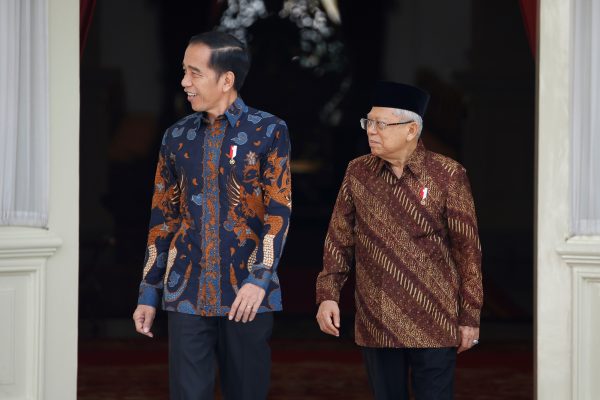Indonesia emerged from the Asian financial crisis in the late 1990s, one of the deepest economic crises in recent global history, and transformed itself into a vibrant, if messy democracy. Over the past two decades it has conducted five successful national elections and maintained democracy in its more than 500 sub-national tiers of government.
Amartya Sen’s Nobel laureate work suggests that democratic societies have less severe economic downturns and often rebound more quickly than countries under other political systems. Since its democratisation, Indonesia has successfully weathered the global financial crisis, the 2013 taper tantrum and the end of the China-driven commodity boom.
The problem for Indonesia today, as Hal Hill argues in our lead essay this week, is that living standards are still not rising fast enough. Without rising living standards and broad-based economic growth, there will not be enough jobs for the country’s rapidly growing population. Poverty, stalled living standards and unemployment could breed resentment, extremism and unrest.
UN population projections have Indonesia growing from 270 million today to 300 million by 2030. By then only the Chinese, US and Indian economies are likely to be larger in purchasing power parity terms. The choices made now will determine how large the economy is and how broadly based its development is shared across society.
Hill says that Indonesia is yet to perform an East Asian miracle like many of its East Asian neighbours. Indonesia is an outlier in not having managed to integrate itself fully into East Asia’s supply chains to the same degree as the rest of Southeast Asia.
The structural reasons for this, beyond the protectionism, have to do with its labour laws, impediments to foreign direct investment and a current account deficit financed by fickle international portfolio capital. There are also the burdens of state-owned enterprises and chronic infrastructure shortages. These problems are all well known to Indonesian policy makers.
But reform has been hard work. Take for example Indonesia’s labour laws — removing worker ‘protection’ is not easy but in a misguided effort to protect workers, in Indonesia dismissed workers are eligible to receive severance pay of as much as 32 months’ pay. Dismissing workers is too costly and there’s not enough labour market flexibility to attract investment.
The structural impediments to foreign investment have apparently caught the attention of the authorities through a September 2019 World Bank report. Vietnam was the recipient of much foreign investment diverted from China due to the US–China trade war. Indonesia has missed out. Five years ago Indonesia was the beneficiary of foreign investment looking for a cheaper production base as Chinese wages rose. Now more has to be done to capitalise on that earlier good fortune.
With President Joko Widodo, or Jokowi as he’s known, winning a second term last April, there are hopes that economic reform will replace the somewhat nationalistic policies that defined his first term.
There are reasons for optimism. Jokowi rose to power as a reformer as mayor of Solo and then governor of Jakarta. His target of 7 per cent growth for Indonesia when he first became president was buried in all the difficulties of his first term, but with growth slowing to 5 per cent there is a sense of urgency now. An omnibus law will be introduced to parliament this month to improve the investment climate and give Jokowi the ability to overrule labour laws.
Although Jokowi might not have the world class technocrats in his cabinet that president Suharto or president Susilo Bambang Yudhoyono did, he does have ‘highly competent professionals running both the Ministry of Finance and Bank Indonesia’, the central bank, as Hill concedes. The Indonesian bureaucracy may be large and difficult to shift, but the capacity at the top has capacity to mix it with the best in the world. The new Deputy Minister of Foreign Affairs Mahendra Siregar has exceptional qualifications to frame the second Jokowi government’s initiatives in global economic affairs.
Jokowi has injected some dynamism into his cabinet with the appointment of the founder and CEO of Indonesia’s tech giant Gojek as Education Minister. Muslim schools will stop teaching about the caliphate and Jihad, and more emphasis is being placed across the board on teaching students how to think and problem solve.
According to Hill, ‘practically every day’ sees Jokowi ‘inaugurating some major infrastructure project’, emphasising the importance of building quality infrastructure.
The trajectory of Indonesia’s economy and society are important globally. Indonesia is a member of the G20, chair of the group of 33 developing countries at the WTO, the main political anchor in Southeast Asia and a strategically important player in Asia. Its links to, and leadership by example, of the Islamic world are important.
Indonesia played a crucial role in delivering the Regional Comprehensive Economic Partnership (RCEP) agreement. Indonesia took a proposal to the G20 on WTO reform that set out a clear framework for how to proceed.
The rest of the world needs to start treating Indonesia like the large, capable and strategic global player that it is. Its recent steps into an activist role on international trade can reinforce the reform effort at home and should be embraced by the global community that still wants to maintain an open, rules-based multilateral system.
The EAF Editorial Board is located in the Crawford School of Public Policy, College of Asia and the Pacific, The Australian National University.

